Subjectivity in English and Vietnamese commentaries - An appraisal contrastive analysis
ABSTRACT
This paper uses Appraisal framework to identify Attitude and Engagement resources in a selection
of texts in order to reveal the level of “subjectivity” in commentaries about political events taken from
two online newspapers: The New York Times and Tuoi Tre. The results show that although there are some
differences in the frequency and the linguistic features of these resources, the genre in the two languages
shares a variety of similarities in their subjectivity level.
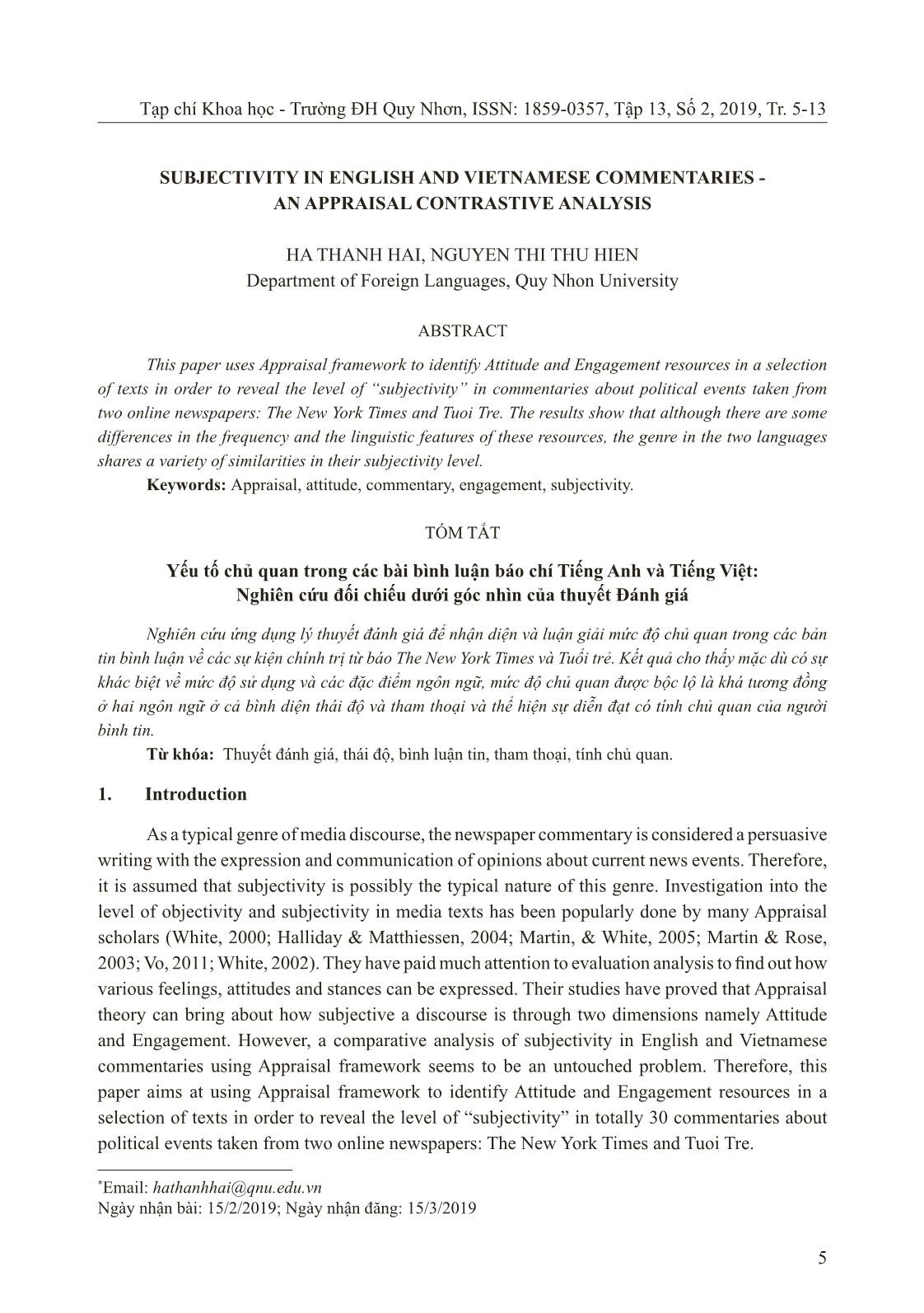
Trang 1
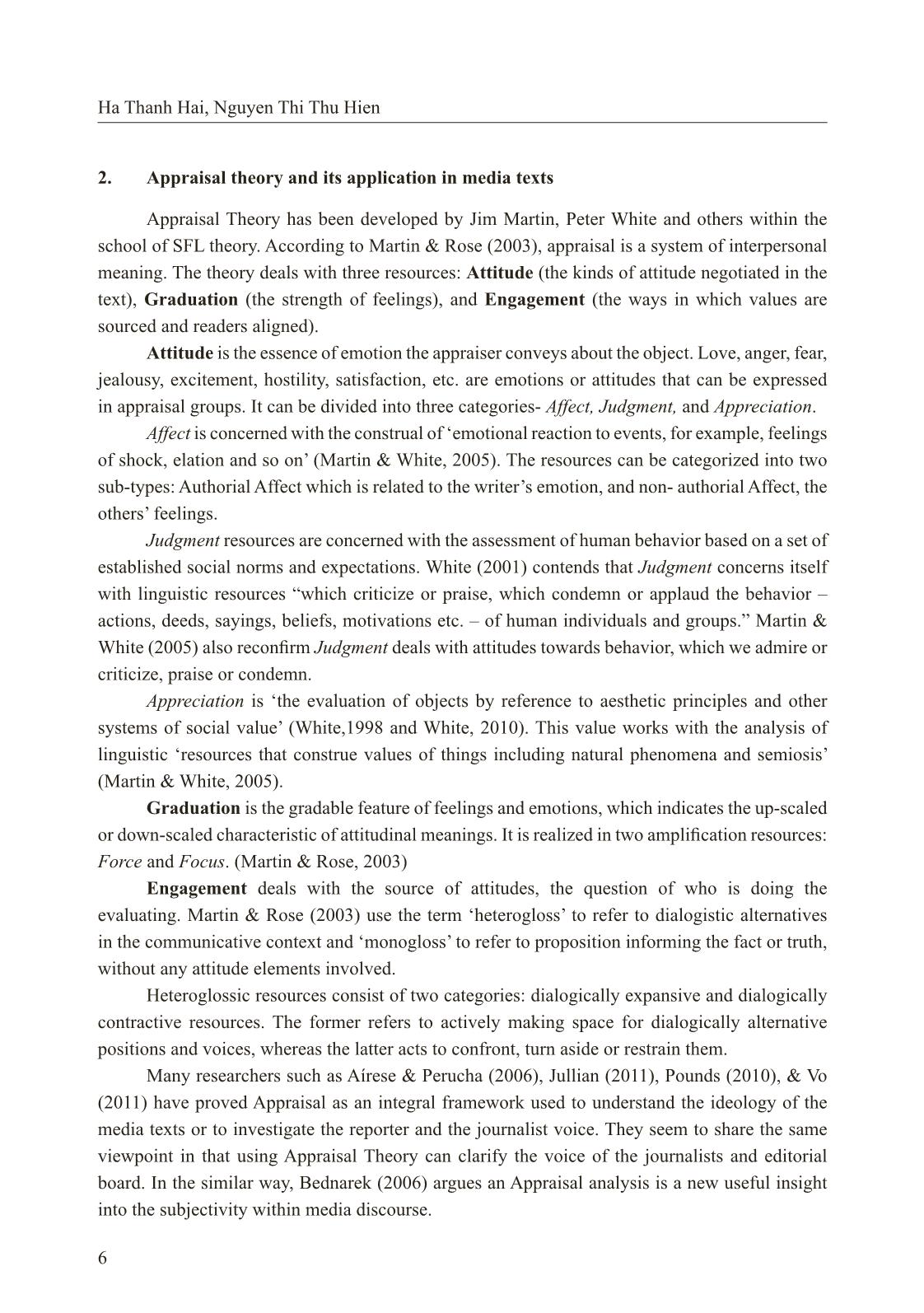
Trang 2
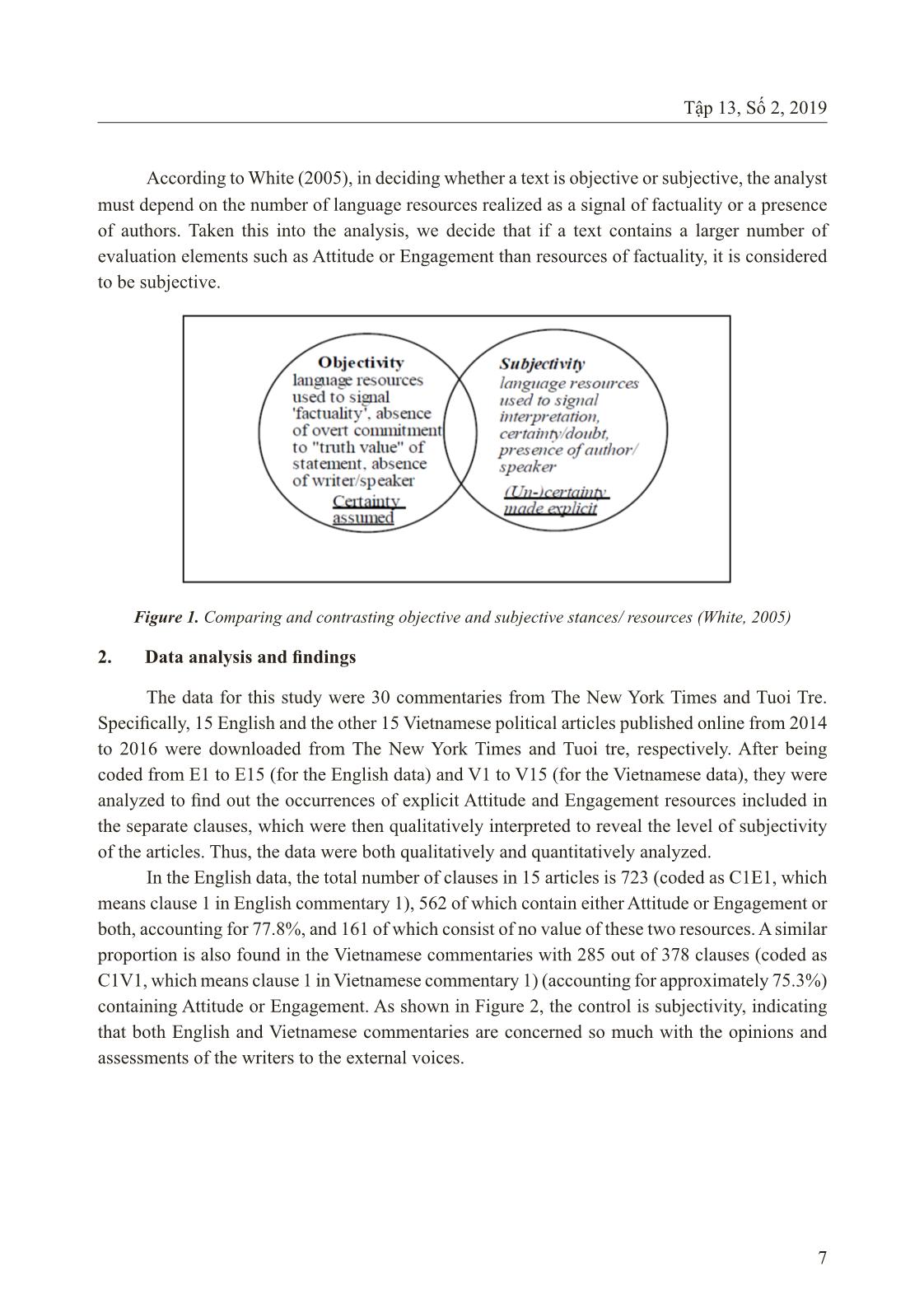
Trang 3
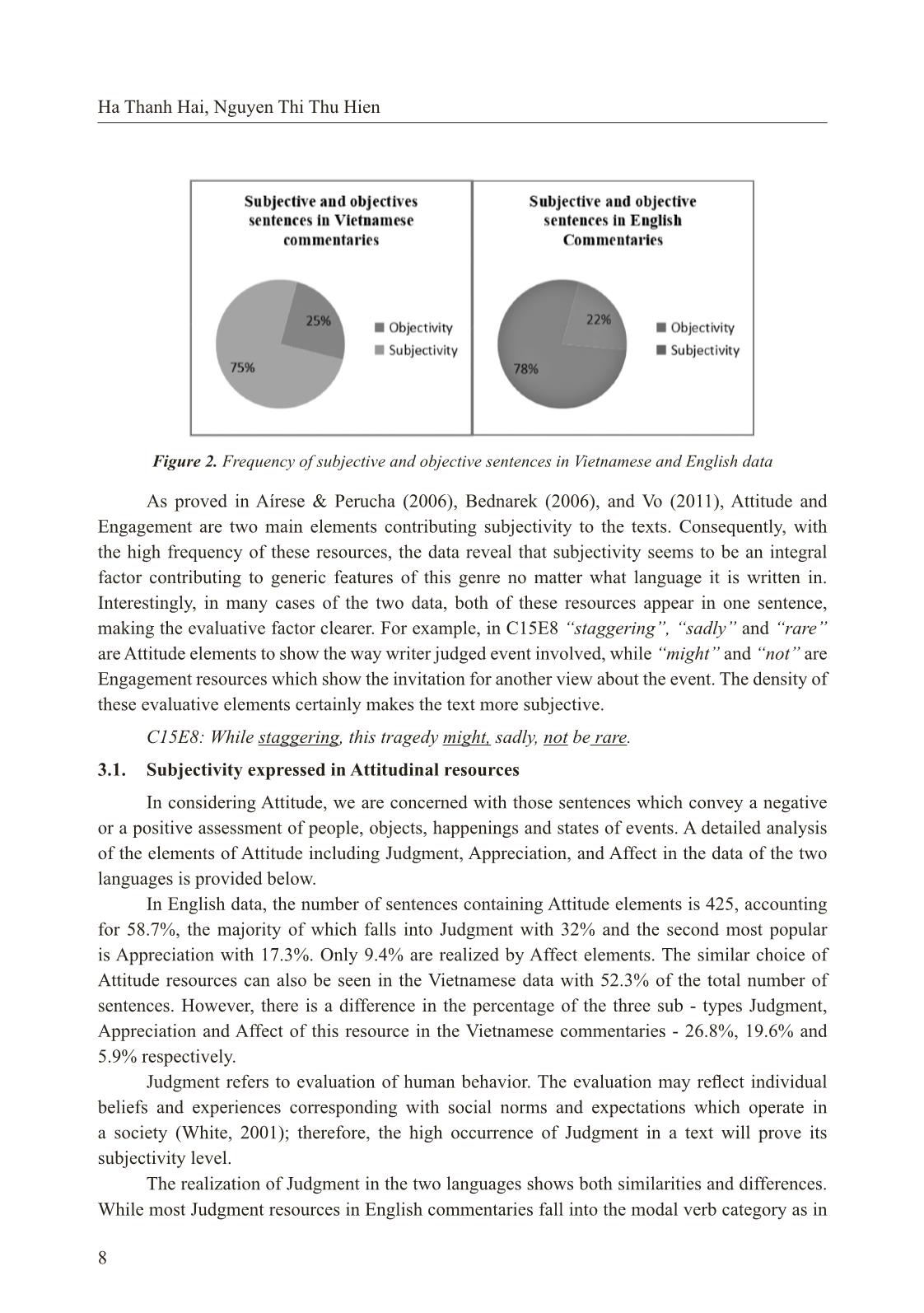
Trang 4
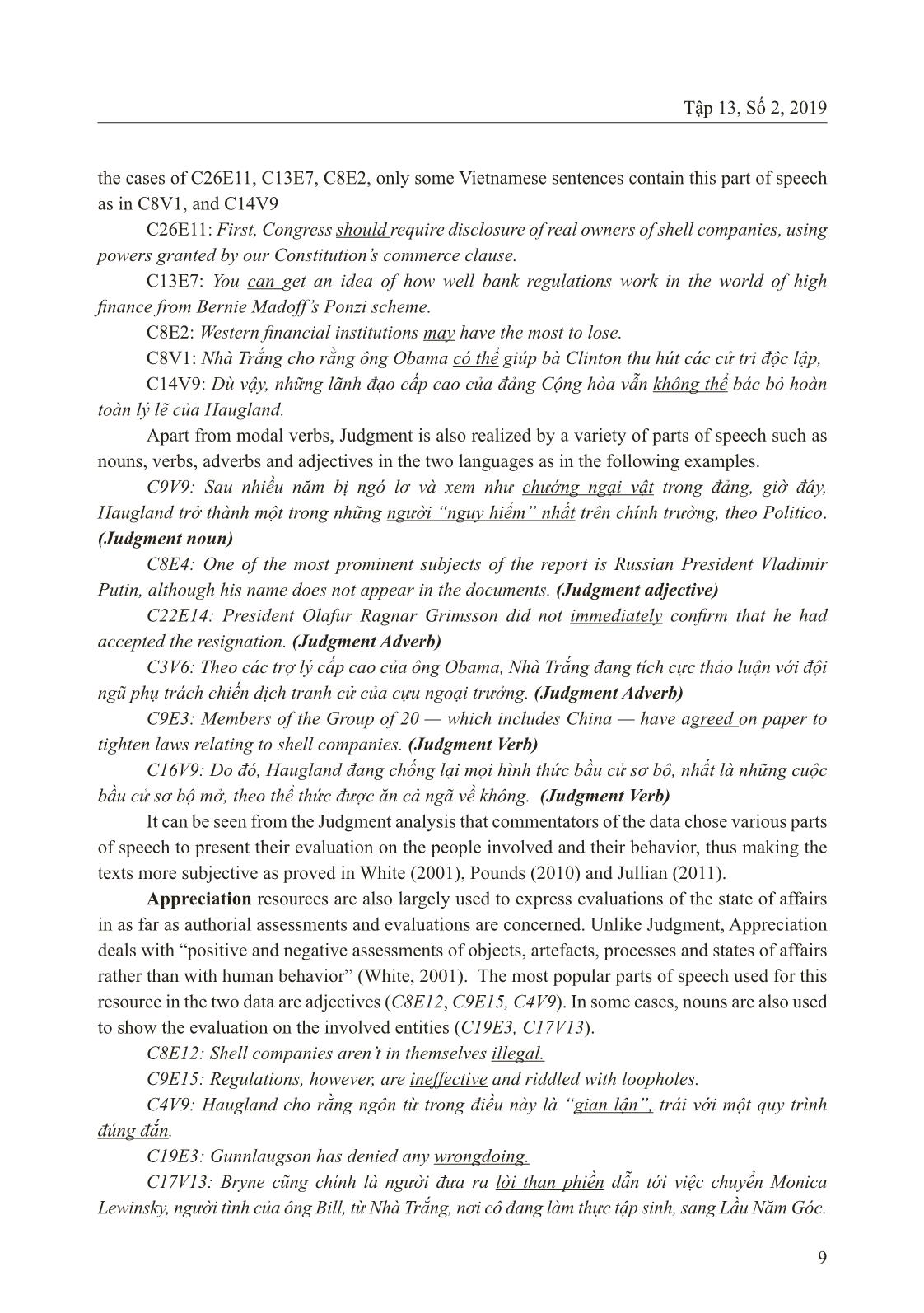
Trang 5
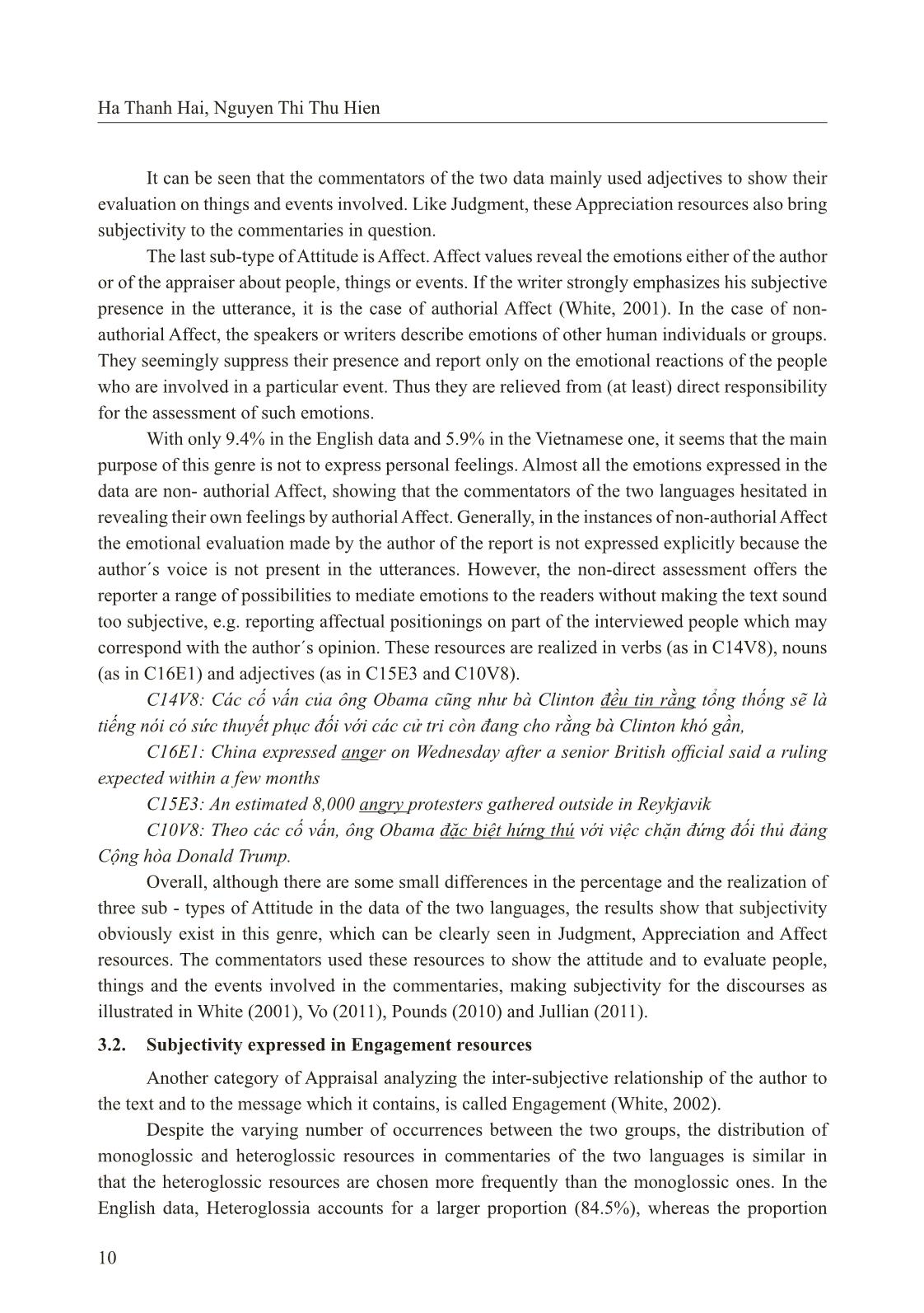
Trang 6
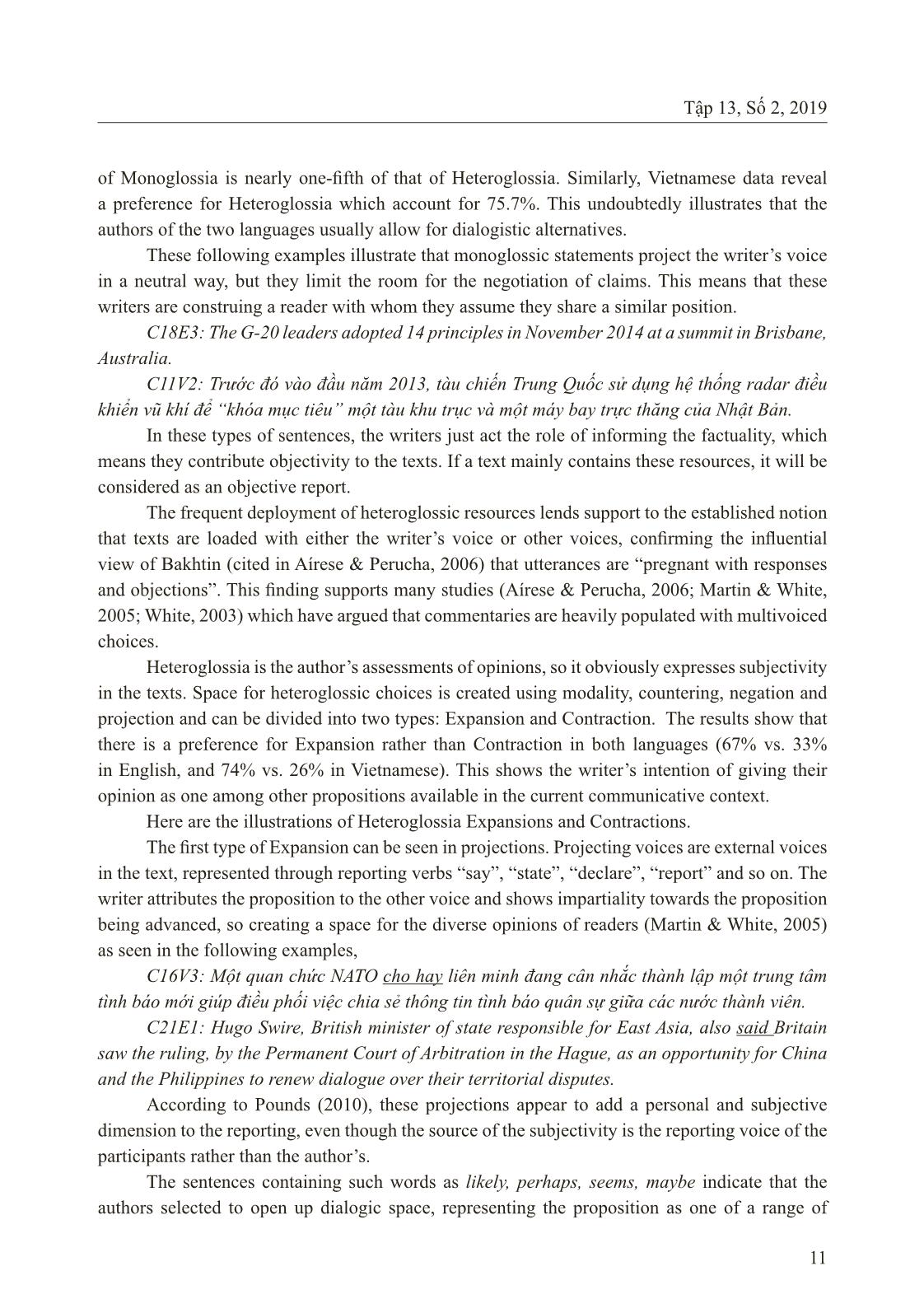
Trang 7
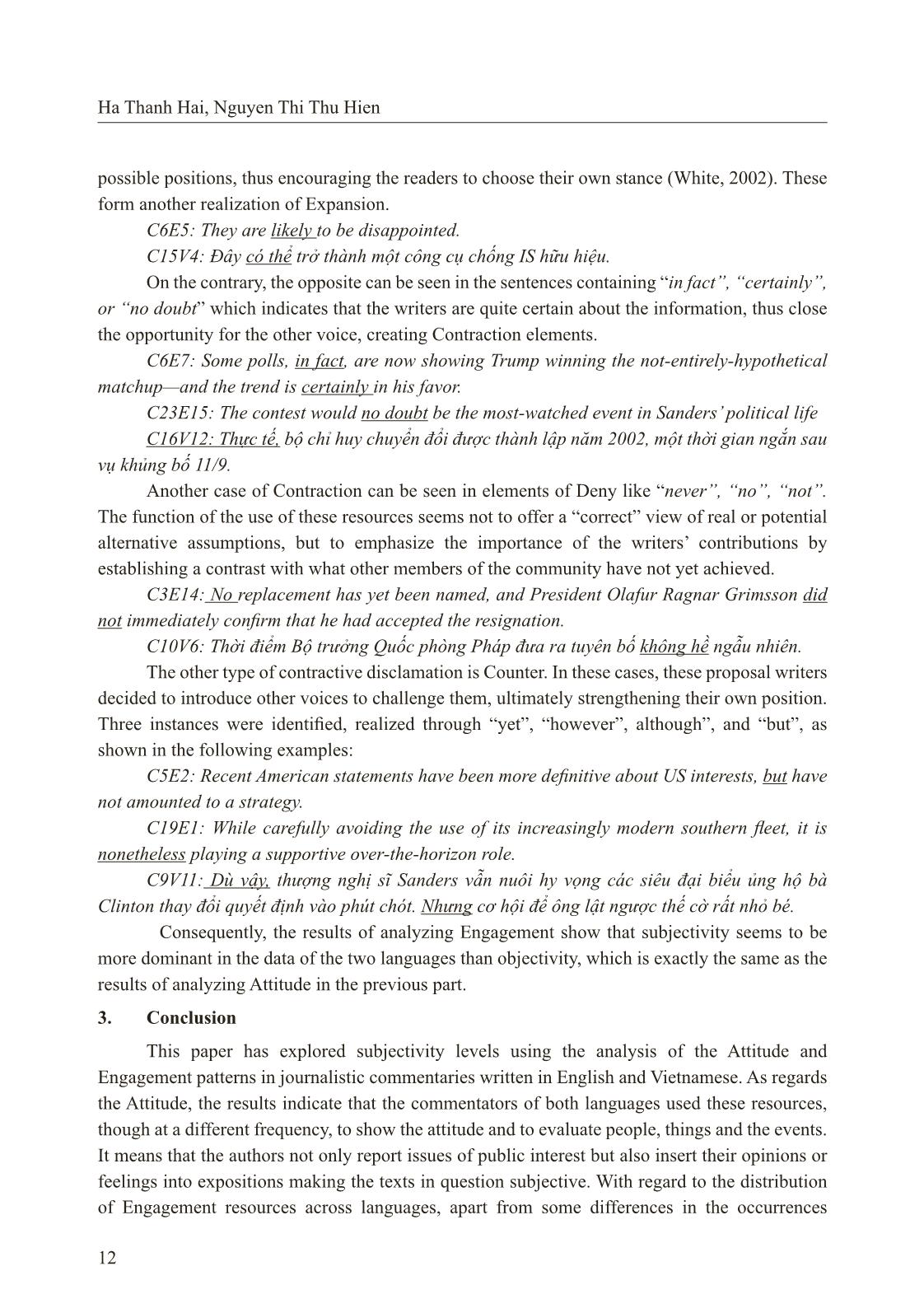
Trang 8
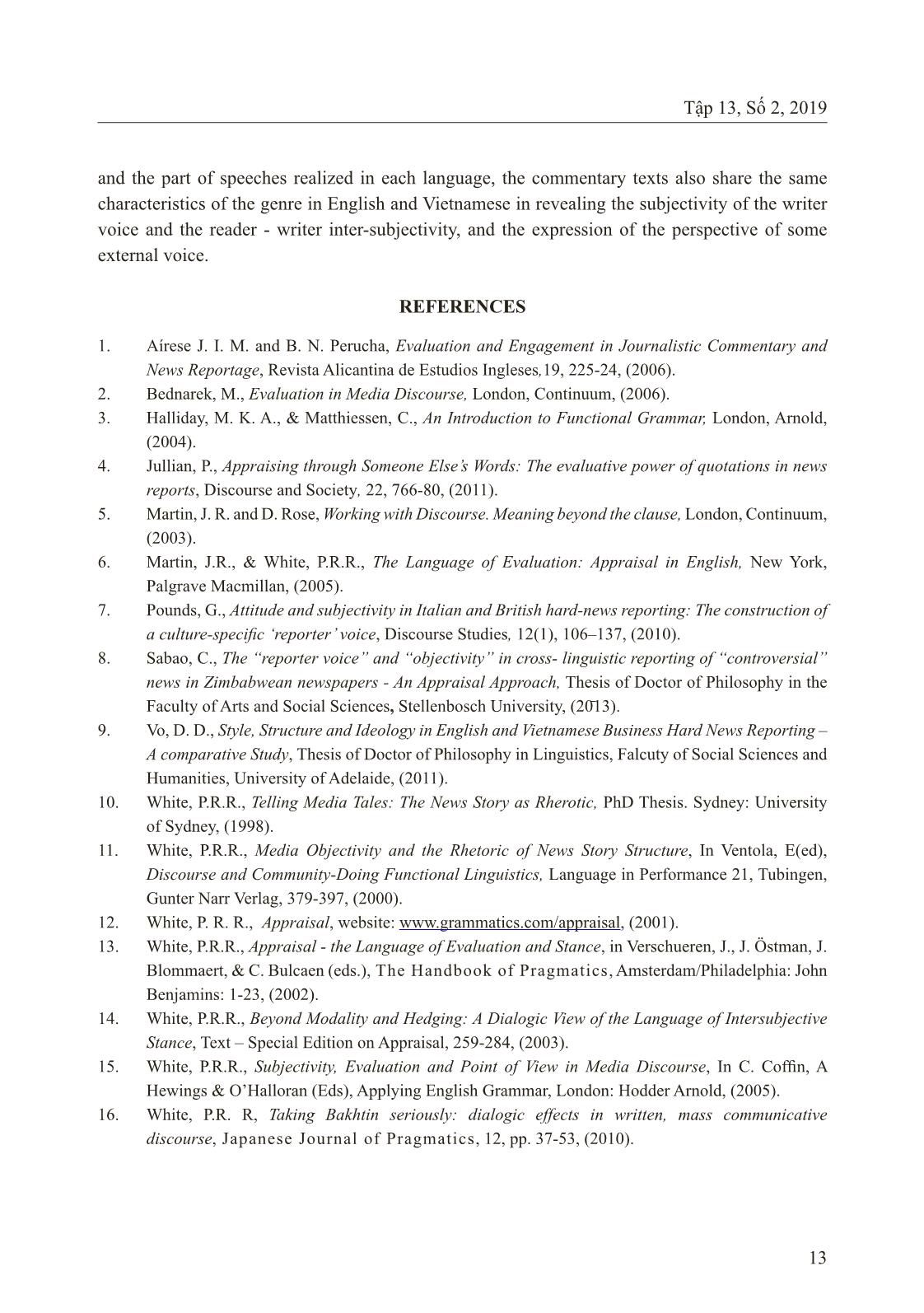
Trang 9
Bạn đang xem tài liệu "Subjectivity in English and Vietnamese commentaries - An appraisal contrastive analysis", để tải tài liệu gốc về máy hãy click vào nút Download ở trên
Tóm tắt nội dung tài liệu: Subjectivity in English and Vietnamese commentaries - An appraisal contrastive analysis
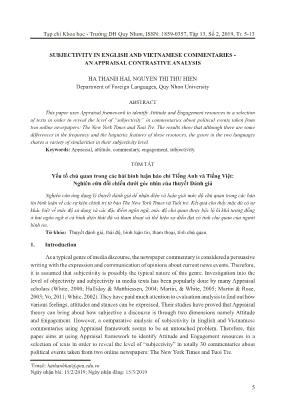
trợ lý cấp cao của ông Obama, Nhà Trắng đang tích cực thảo luận với đội ngũ phụ trách chiến dịch tranh cử của cựu ngoại trưởng. (Judgment Adverb) C9E3: Members of the Group of 20 — which includes China — have agreed on paper to tighten laws relating to shell companies. (Judgment Verb) C16V9: Do đó, Haugland đang chống lại mọi hình thức bầu cử sơ bộ, nhất là những cuộc bầu cử sơ bộ mở, theo thể thức được ăn cả ngã về không. (Judgment Verb) It can be seen from the Judgment analysis that commentators of the data chose various parts of speech to present their evaluation on the people involved and their behavior, thus making the texts more subjective as proved in White (2001), Pounds (2010) and Jullian (2011). Appreciation resources are also largely used to express evaluations of the state of affairs in as far as authorial assessments and evaluations are concerned. Unlike Judgment, Appreciation deals with “positive and negative assessments of objects, artefacts, processes and states of affairs rather than with human behavior” (White, 2001). The most popular parts of speech used for this resource in the two data are adjectives (C8E12, C9E15, C4V9). In some cases, nouns are also used to show the evaluation on the involved entities (C19E3, C17V13). C8E12: Shell companies aren’t in themselves illegal. C9E15: Regulations, however, are ineffective and riddled with loopholes. C4V9: Haugland cho rằng ngôn từ trong điều này là “gian lận”, trái với một quy trình đúng đắn. C19E3: Gunnlaugson has denied any wrongdoing. C17V13: Bryne cũng chính là người đưa ra lời than phiền dẫn tới việc chuyển Monica Lewinsky, người tình của ông Bill, từ Nhà Trắng, nơi cô đang làm thực tập sinh, sang Lầu Năm Góc. 9 Ha Thanh Hai, Nguyen Thi Thu Hien It can be seen that the commentators of the two data mainly used adjectives to show their evaluation on things and events involved. Like Judgment, these Appreciation resources also bring subjectivity to the commentaries in question. The last sub-type of Attitude is Affect. Affect values reveal the emotions either of the author or of the appraiser about people, things or events. If the writer strongly emphasizes his subjective presence in the utterance, it is the case of authorial Affect (White, 2001). In the case of non- authorial Affect, the speakers or writers describe emotions of other human individuals or groups. They seemingly suppress their presence and report only on the emotional reactions of the people who are involved in a particular event. Thus they are relieved from (at least) direct responsibility for the assessment of such emotions. With only 9.4% in the English data and 5.9% in the Vietnamese one, it seems that the main purpose of this genre is not to express personal feelings. Almost all the emotions expressed in the data are non- authorial Affect, showing that the commentators of the two languages hesitated in revealing their own feelings by authorial Affect. Generally, in the instances of non-authorial Affect the emotional evaluation made by the author of the report is not expressed explicitly because the author´s voice is not present in the utterances. However, the non-direct assessment offers the reporter a range of possibilities to mediate emotions to the readers without making the text sound too subjective, e.g. reporting affectual positionings on part of the interviewed people which may correspond with the author´s opinion. These resources are realized in verbs (as in C14V8), nouns (as in C16E1) and adjectives (as in C15E3 and C10V8). C14V8: Các cố vấn của ông Obama cũng như bà Clinton đều tin rằng tổng thống sẽ là tiếng nói có sức thuyết phục đối với các cử tri còn đang cho rằng bà Clinton khó gần, C16E1: China expressed anger on Wednesday after a senior British official said a ruling expected within a few months C15E3: An estimated 8,000 angry protesters gathered outside in Reykjavik C10V8: Theo các cố vấn, ông Obama đặc biệt hứng thú với việc chặn đứng đối thủ đảng Cộng hòa Donald Trump. Overall, although there are some small differences in the percentage and the realization of three sub - types of Attitude in the data of the two languages, the results show that subjectivity obviously exist in this genre, which can be clearly seen in Judgment, Appreciation and Affect resources. The commentators used these resources to show the attitude and to evaluate people, things and the events involved in the commentaries, making subjectivity for the discourses as illustrated in White (2001), Vo (2011), Pounds (2010) and Jullian (2011). 3.2. Subjectivity expressed in Engagement resources Another category of Appraisal analyzing the inter-subjective relationship of the author to the text and to the message which it contains, is called Engagement (White, 2002). Despite the varying number of occurrences between the two groups, the distribution of monoglossic and heteroglossic resources in commentaries of the two languages is similar in that the heteroglossic resources are chosen more frequently than the monoglossic ones. In the English data, Heteroglossia accounts for a larger proportion (84.5%), whereas the proportion 10 Tập 13, Số 2, 2019 of Monoglossia is nearly one-fifth of that of Heteroglossia. Similarly, Vietnamese data reveal a preference for Heteroglossia which account for 75.7%. This undoubtedly illustrates that the authors of the two languages usually allow for dialogistic alternatives. These following examples illustrate that monoglossic statements project the writer’s voice in a neutral way, but they limit the room for the negotiation of claims. This means that these writers are construing a reader with whom they assume they share a similar position. C18E3: The G-20 leaders adopted 14 principles in November 2014 at a summit in Brisbane, Australia. C11V2: Trước đó vào đầu năm 2013, tàu chiến Trung Quốc sử dụng hệ thống radar điều khiển vũ khí để “khóa mục tiêu” một tàu khu trục và một máy bay trực thăng của Nhật Bản. In these types of sentences, the writers just act the role of informing the factuality, which means they contribute objectivity to the texts. If a text mainly contains these resources, it will be considered as an objective report. The frequent deployment of heteroglossic resources lends support to the established notion that texts are loaded with either the writer’s voice or other voices, confirming the influential view of Bakhtin (cited in Aírese & Perucha, 2006) that utterances are “pregnant with responses and objections”. This finding supports many studies (Aírese & Perucha, 2006; Martin & White, 2005; White, 2003) which have argued that commentaries are heavily populated with multivoiced choices. Heteroglossia is the author’s assessments of opinions, so it obviously expresses subjectivity in the texts. Space for heteroglossic choices is created using modality, countering, negation and projection and can be divided into two types: Expansion and Contraction. The results show that there is a preference for Expansion rather than Contraction in both languages (67% vs. 33% in English, and 74% vs. 26% in Vietnamese). This shows the writer’s intention of giving their opinion as one among other propositions available in the current communicative context. Here are the illustrations of Heteroglossia Expansions and Contractions. The first type of Expansion can be seen in projections. Projecting voices are external voices in the text, represented through reporting verbs “say”, “state”, “declare”, “report” and so on. The writer attributes the proposition to the other voice and shows impartiality towards the proposition being advanced, so creating a space for the diverse opinions of readers (Martin & White, 2005) as seen in the following examples, C16V3: Một quan chức NATO cho hay liên minh đang cân nhắc thành lập một trung tâm tình báo mới giúp điều phối việc chia sẻ thông tin tình báo quân sự giữa các nước thành viên. C21E1: Hugo Swire, British minister of state responsible for East Asia, also said Britain saw the ruling, by the Permanent Court of Arbitration in the Hague, as an opportunity for China and the Philippines to renew dialogue over their territorial disputes. According to Pounds (2010), these projections appear to add a personal and subjective dimension to the reporting, even though the source of the subjectivity is the reporting voice of the participants rather than the author’s. The sentences containing such words as likely, perhaps, seems, maybe indicate that the authors selected to open up dialogic space, representing the proposition as one of a range of 11 Ha Thanh Hai, Nguyen Thi Thu Hien possible positions, thus encouraging the readers to choose their own stance (White, 2002). These form another realization of Expansion. C6E5: They are likely to be disappointed. C15V4: Đây có thể trở thành một công cụ chống IS hữu hiệu. On the contrary, the opposite can be seen in the sentences containing “in fact”, “certainly”, or “no doubt” which indicates that the writers are quite certain about the information, thus close the opportunity for the other voice, creating Contraction elements. C6E7: Some polls, in fact, are now showing Trump winning the not-entirely-hypothetical matchup—and the trend is certainly in his favor. C23E15: The contest would no doubt be the most-watched event in Sanders’ political life C16V12: Thực tế, bộ chỉ huy chuyển đổi được thành lập năm 2002, một thời gian ngắn sau vụ khủng bố 11/9. Another case of Contraction can be seen in elements of Deny like “never”, “no”, “not”. The function of the use of these resources seems not to offer a “correct” view of real or potential alternative assumptions, but to emphasize the importance of the writers’ contributions by establishing a contrast with what other members of the community have not yet achieved. C3E14: No replacement has yet been named, and President Olafur Ragnar Grimsson did not immediately confirm that he had accepted the resignation. C10V6: Thời điểm Bộ trưởng Quốc phòng Pháp đưa ra tuyên bố không hề ngẫu nhiên. The other type of contractive disclamation is Counter. In these cases, these proposal writers decided to introduce other voices to challenge them, ultimately strengthening their own position. Three instances were identified, realized through “yet”, “however”, although”, and “but”, as shown in the following examples: C5E2: Recent American statements have been more definitive about US interests,but have not amounted to a strategy. C19E1: While carefully avoiding the use of its increasingly modern southern fleet, it is nonetheless playing a supportive over-the-horizon role. C9V11: Dù vậy, thượng nghị sĩ Sanders vẫn nuôi hy vọng các siêu đại biểu ủng hộ bà Clinton thay đổi quyết định vào phút chót. Nhưng cơ hội để ông lật ngược thế cờ rất nhỏ bé. Consequently, the results of analyzing Engagement show that subjectivity seems to be more dominant in the data of the two languages than objectivity, which is exactly the same as the results of analyzing Attitude in the previous part. 3. Conclusion This paper has explored subjectivity levels using the analysis of the Attitude and Engagement patterns in journalistic commentaries written in English and Vietnamese. As regards the Attitude, the results indicate that the commentators of both languages used these resources, though at a different frequency, to show the attitude and to evaluate people, things and the events. It means that the authors not only report issues of public interest but also insert their opinions or feelings into expositions making the texts in question subjective. With regard to the distribution of Engagement resources across languages, apart from some differences in the occurrences 12 Tập 13, Số 2, 2019 and the part of speeches realized in each language, the commentary texts also share the same characteristics of the genre in English and Vietnamese in revealing the subjectivity of the writer voice and the reader - writer inter-subjectivity, and the expression of the perspective of some external voice. REFERENCES 1. Aírese J. I. M. and B. N. Perucha, Evaluation and Engagement in Journalistic Commentary and News Reportage, Revista Alicantina de Estudios Ingleses,19, 225-24, (2006). 2. Bednarek, M., Evaluation in Media Discourse, London, Continuum, (2006). 3. Halliday, M. K. A., & Matthiessen, C., An Introduction to Functional Grammar, London, Arnold, (2004). 4. Jullian, P., Appraising through Someone Else’s Words: The evaluative power of quotations in news reports, Discourse and Society, 22, 766-80, (2011). 5. Martin, J. R. and D. Rose, Working with Discourse. Meaning beyond the clause, London, Continuum, (2003). 6. Martin, J.R., & White, P.R.R., The Language of Evaluation: Appraisal in English, New York, Palgrave Macmillan, (2005). 7. Pounds, G., Attitude and subjectivity in Italian and British hard-news reporting: The construction of a culture-specific ‘reporter’ voice, Discourse Studies, 12(1), 106–137, (2010). 8. Sabao, C., The “reporter voice” and “objectivity” in cross- linguistic reporting of “controversial” news in Zimbabwean newspapers - An Appraisal Approach, Thesis of Doctor of Philosophy in the Faculty of Arts and Social Sciences, Stellenbosch University, (2013). 9. Vo, D. D., Style, Structure and Ideology in English and Vietnamese Business Hard News Reporting – A comparative Study, Thesis of Doctor of Philosophy in Linguistics, Falcuty of Social Sciences and Humanities, University of Adelaide, (2011). 10. White, P.R.R., Telling Media Tales: The News Story as Rherotic, PhD Thesis. Sydney: University of Sydney, (1998). 11. White, P.R.R., Media Objectivity and the Rhetoric of News Story Structure, In Ventola, E(ed), Discourse and Community-Doing Functional Linguistics, Language in Performance 21, Tubingen, Gunter Narr Verlag, 379-397, (2000). 12. White, P. R. R., Appraisal, website: www.grammatics.com/appraisal, (2001). 13. White, P.R.R., Appraisal - the Language of Evaluation and Stance, in Verschueren, J., J. Östman, J. Blommaert, & C. Bulcaen (eds.), The Handbook of Pragmatics, Amsterdam/Philadelphia: John Benjamins: 1-23, (2002). 14. White, P.R.R., Beyond Modality and Hedging: A Dialogic View of the Language of Intersubjective Stance, Text – Special Edition on Appraisal, 259-284, (2003). 15. White, P.R.R., Subjectivity, Evaluation and Point of View in Media Discourse, In C. Coffin, A Hewings & O’Halloran (Eds), Applying English Grammar, London: Hodder Arnold, (2005). 16. White, P.R. R, Taking Bakhtin seriously: dialogic effects in written, mass communicative discourse, Japanese Journal of Pragmatics, 12, pp. 37-53, (2010). 13
File đính kèm:
 subjectivity_in_english_and_vietnamese_commentaries_an_appra.pdf
subjectivity_in_english_and_vietnamese_commentaries_an_appra.pdf

